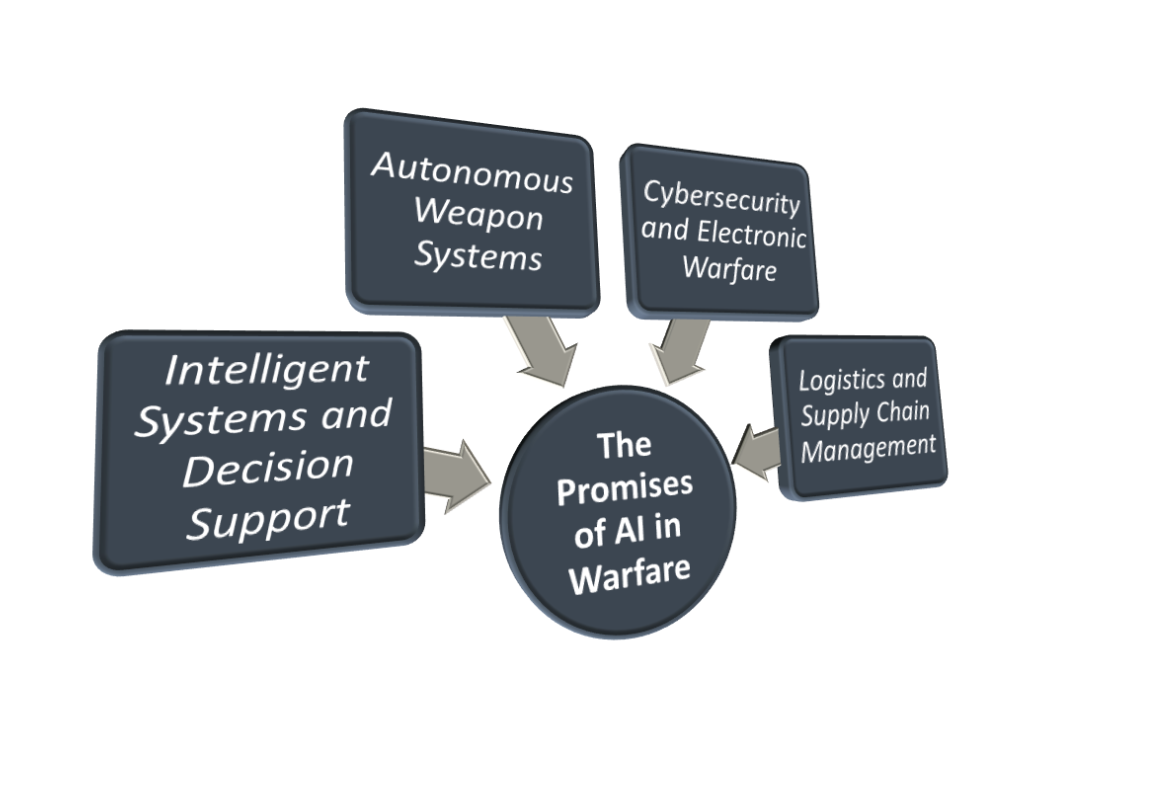
The Controversial Convergence of AI and Warfare
The rapid advancement of AI has sparked both excitement and apprehension across various sectors, with the field of warfare being no exception.
The potential integration of artificial intelligence (AI) into military operations promises unprecedented capabilities but also raises profound ethical and strategic concerns. As nations around the world race to harness the power of AI, the implications for the future of warfare are far-reaching and complex.
The Promises of AI in Warfare

Proponents of AI in warfare argue that its integration could revolutionize military operations, leading to more efficient and effective decision-making, enhanced situational awareness, and improved combat strategies. Here are some of the key potential benefits:
1. Intelligent Systems and Decision Support: AI algorithms can process vast amounts of data from multiple sources, such as intelligence reports, sensor feeds, and historical data, to provide real-time analysis and recommendations to human commanders. This could facilitate more informed and timely decisions, particularly in rapidly evolving combat situations.
2. Autonomous Weapon Systems: Perhaps the most controversial application of AI in warfare is the development of autonomous weapon systems, often referred to as "killer robots." These systems could potentially identify, track, and engage targets without human intervention, theoretically improving reaction times and reducing the risk to human soldiers.
3. Cybersecurity and Electronic Warfare: AI could play a crucial role in cybersecurity and electronic warfare, detecting and responding to cyber threats, identifying vulnerabilities in enemy systems, and enhancing the protection of critical infrastructure and communication networks.
4. Logistics and Supply Chain Management: AI-powered systems could optimize the movement of troops, equipment, and supplies, leading to more efficient logistics operations and reducing the strain on human resources.
The Ethical and Strategic Concerns
Despite the potential advantages, the integration of AI into warfare raises significant ethical and strategic concerns that must be carefully considered:
1. Accountability and Responsibility: As AI systems become more autonomous, questions arise regarding who is ultimately responsible for their actions, particularly in cases where civilian casualties or unintended consequences occur. This issue becomes even more complex when AI systems are designed to make decisions without human oversight.
2. Bias and Unpredictability: AI algorithms are trained on data, which can be biased or incomplete, potentially leading to biased or unpredictable outcomes. In the context of warfare, such biases could have devastating consequences, and the unpredictability of AI systems could undermine trust and strategic planning.
3. Proliferation and Arms Race: The development of AI-powered weapon systems could trigger a new arms race, as nations seek to gain a competitive advantage. This could destabilize regional and global security, increase the risk of conflicts, and divert resources from other essential areas.
4. Human Control and Meaningful Human Control: There is an ongoing debate about the level of human control that should be maintained over AI systems in warfare. While some argue for retaining meaningful human control, others believe that complete autonomy is necessary for AI systems to be effective in combat situations.
5. Legal and Ethical Frameworks: Existing legal and ethical frameworks governing warfare may need to be updated to account for the unique challenges posed by AI systems. Issues such as compliance with international humanitarian law, the principles of distinction and proportionality, and the protection of civilian populations must be carefully considered.
The Global AI Arms Race
As the potential benefits and risks of AI in warfare become increasingly apparent, nations around the world are intensifying their efforts to develop and integrate AI technologies into their military capabilities. This global AI arms race has significant implications for the future of warfare and international security.
The United States, China, Russia, and several other major powers are investing heavily in AI research and development for military applications. The U.S. Department of Defense has established various initiatives, such as the Joint Artificial Intelligence Center (JAIC) and the Defense Advanced Research Projects Agency (DARPA), to accelerate the integration of AI into its operations.
China, on the other hand, has made AI a national priority and is actively pursuing the development of autonomous weapon systems, as well as AI-powered intelligence gathering and decision support capabilities. Russia, too, has expressed its intention to leverage AI in warfare, with a particular focus on cybersecurity and electronic warfare.
This global competition to harness the power of AI for military purposes has raised concerns about the potential destabilization of the international security landscape. As nations race to gain a technological advantage, the risk of miscalculation and unintended escalation increases, potentially leading to heightened tensions and conflicts.
The Debate on Regulation and International Cooperation
In response to the concerns surrounding the integration of AI into warfare, there have been calls for international cooperation and the establishment of robust regulatory frameworks to govern the development and use of AI technologies in military contexts.
Organizations such as the United Nations and various non-governmental organizations have advocated for the adoption of legally binding instruments that would prohibit or strictly regulate the development and use of certain AI-powered weapon systems, particularly those capable of selecting and engaging targets without meaningful human control.
However, achieving global consensus on such regulations has proven challenging, as nations have divergent interests and varying levels of technological advancement. Some argue that a complete ban on autonomous weapon systems is unrealistic and that efforts should instead focus on ensuring meaningful human control and establishing clear guidelines for their development and deployment.
Additionally, concerns have been raised about the potential for dual-use technologies, where AI systems developed for civilian purposes could be repurposed for military applications, further complicating the regulation efforts.
The Future of AI and Warfare
As the integration of AI into warfare continues to evolve, it is clear that the implications will be far-reaching and profound. The potential benefits of enhanced decision-making, improved situational awareness, and more efficient operations cannot be ignored. However, the ethical and strategic concerns surrounding accountability, bias, proliferation, and legal frameworks must be addressed through robust international cooperation and regulatory frameworks.
The global AI arms race also raises questions about the long-term consequences of unchecked development and deployment of AI-powered weapon systems. While some argue that such systems could ultimately reduce human casualties and the overall impact of warfare, others warn of the potential for unintended escalation and the erosion of human control over the decision to engage in armed conflict.
Ultimately, the future of AI and warfare will be shaped by the collective actions of nations, policymakers, researchers, and civil society organizations. It is imperative that a balanced approach is pursued, one that harnesses the transformative potential of AI while ensuring that its development and use in warfare adheres to ethical principles, international law, and the preservation of human dignity.
As the world grapples with the complexities of this issue, continued dialogue, transparency, and a commitment to responsible innovation will be crucial in navigating the intricate relationship between AI and warfare, and in shaping a future where technological advancements serve to enhance global security and stability.
Trending
-
1 76 Theses on American Patriotism
Timothy Taylor -
2 A Comprehensive Approach to Handling Riots
Bhumesh Verma -
3 Innovative Approaches to Diplomacy: A Multi-Pronged Strategy for The Phygital Era
Dr. Ingrid Vasiliu-Feltes -
4 Business Chiefs Gather to Discuss India Trade Deal Proposals
Nitish Mathur -
5 Everything You Need to Know About Jordan Bardella
Felix Yim





Comments